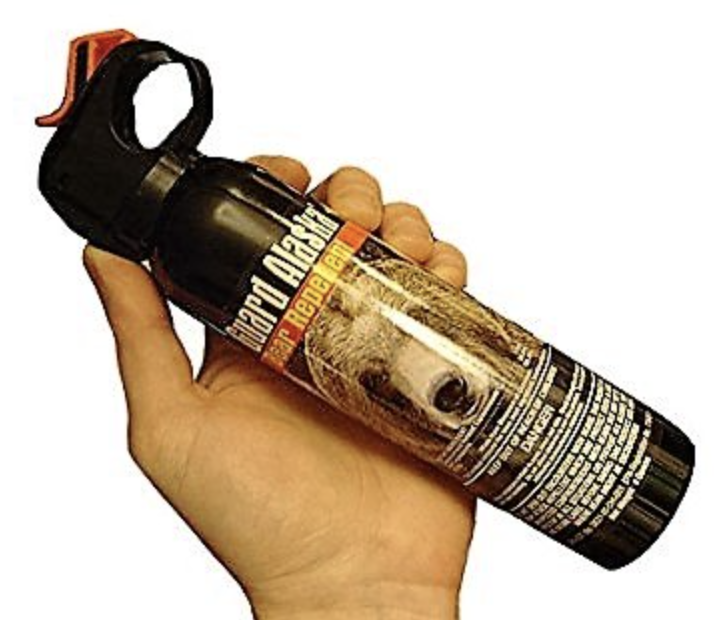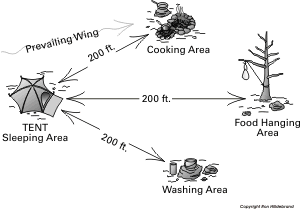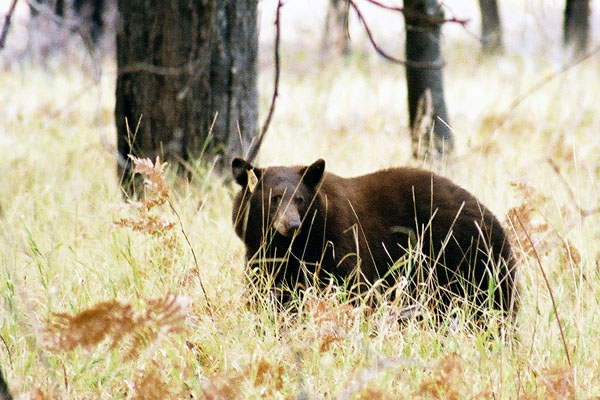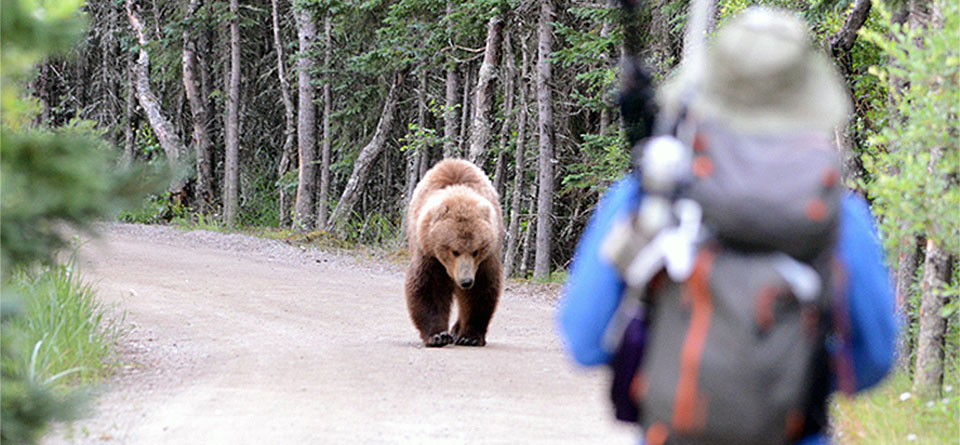As an Amazon Associate, we earn from qualifying purchases. This is without any additional costs for the buyer but does support us in maintaining our website.
 Camping is one of the most fun outdoor activities you can do with your friends or family. But it’s also not without any dangers. In certain areas in the US and Canada, one common form of such threats is a bear encounter.
Camping is one of the most fun outdoor activities you can do with your friends or family. But it’s also not without any dangers. In certain areas in the US and Canada, one common form of such threats is a bear encounter.
Bears are naturally territorial, and if they feel or see any unfamiliar presence within their territory, regardless if it’s hostile or not, some of them will likely respond with aggressiveness. And that aggressiveness can quickly turn to an attack towards you. However, not all bears have the same behavior. Some may flee in response to your presence, while others will be quick to defend their area, especially if it’s a female bear guarding its cubs.
There are a lot of factors to consider when trying to camp on an area that is prone to bear sightings. And just like there are a lot of ways you can properly respond to a bear encounter, there are also just as many ways you can do things wrong.
You might have already seen some of these proper bear responses on TV, or have read it online, but you’ll never know how it truly feels until you’re left face to face with an actual bear. But fear not. This article will help you prepare for a camping trip on a known bear area, as well as how to respond to a potential encounter with one.
#1 Gear up right
 Making a checklist and using it before and after your camping trip is a great way to keep track of all your essential hiking gears. Aside from the essentials, there’s really not much difference in what hiking gear you should bring between a camping trip on a bear-prone area and one that is not.
Making a checklist and using it before and after your camping trip is a great way to keep track of all your essential hiking gears. Aside from the essentials, there’s really not much difference in what hiking gear you should bring between a camping trip on a bear-prone area and one that is not.
Just make sure you bring some extras just in case a bear happens to snoop in your camp and meddle with your equipment, even though it is unlikely to happen. It’s also a good idea to stock up on bear repellants and sprays.
#2 Set up your campsite appropriately
 A common campsite setup in a bear area involves separating your cooking and food storage zone from your main or sleeping space, with a distance of at least 100 yards. You do this because bears have very sensitive noses, and the former two areas tend to gather the most odors, which are usually inviting to bears.
A common campsite setup in a bear area involves separating your cooking and food storage zone from your main or sleeping space, with a distance of at least 100 yards. You do this because bears have very sensitive noses, and the former two areas tend to gather the most odors, which are usually inviting to bears.
When setting up your main camp, or sleeping area, make sure it’s nowhere near thick bushes or fruit patches, to avoid any surprise encounters. Setting up camp on an area with an animal carcass present should also be avoided, even if you’re fine disposing it yourself, since it will still leave a scent.
Aside from separating your main camp from your storage and cooking area, you also need to make other necessary arrangements to the latter two. Unless you want to starve, it is recommended to hang your intense-smelling foods and items at least 10-15 feet off the ground. But if you have bear-proof containers, then by all means use them.
#3 Prepare and eat your food properly
 One of the worse things that can happen during your camping trip on a bear area is having one rummaging after your leftovers. With that in mind, properly disposing of food scraps or leaving none at all, is recommended. Also always maintain the right distance between cooking and sleeping areas when preparing food.
One of the worse things that can happen during your camping trip on a bear area is having one rummaging after your leftovers. With that in mind, properly disposing of food scraps or leaving none at all, is recommended. Also always maintain the right distance between cooking and sleeping areas when preparing food.
For preparing your food you can bring small and light camping hiking stoves. You can easily clean these and store them away in a safe way.
Wash your used utensils away from your main camp, or simply dispose the washed food particles on an area that is just as far if you don’t want to do the former. Furthermore, never leave any food or beverage near or in your tents, especially in your sleeping bags. It’s also recommended to change into your sleeping clothes after a cookout to avoid leaving any traces of food scent on you during the night.
#4 Maintain a clean camp and dispose your trash correctly
If there’s one thing bears love, it’s a messy camp. So unless you want to invite bears into your camp, you better keep it spic and span.
Pack your trash well away from your main campsite, but never bury them. Even when you put your garbage under the ground, bears will still know it’s there. And when they do find it, they’ll remember where it was, which could mean trouble for your next camping, or even for other campers as well. Burning is also not ideal for getting rid of your trash.
#5 Spend your night accordingly
If you are wondering if it’s safe to setup a campfire in an identified bear area, the answer is yes. But if you’re asking if it can, in any way, fend off or scare a bear away, the quick answer is no.
Bears don’t want to come near you any more than you want to go towards them, so setting up a campfire is not at all different than making your presence known during the day. However, you should make sure that your fire’s smoke doesn’t get blown towards your tent. Moreover, you should favor sleeping inside your tent more, rather than spending the night outside.
#6 Avoiding the worst case scenario
 There are many other rules and guidelines involved when it comes to actually avoiding bears. Here are some of the other recommended ones you should remember:
There are many other rules and guidelines involved when it comes to actually avoiding bears. Here are some of the other recommended ones you should remember:
- Making periodic noises is an effective method of making your presence known to any nearby bears. This will prompt bears to either flee or get cautious and avoid you entirely.
- When you spot a bear, never approach it under any circumstance. Personal space is very important to them, especially female ones.
- Trek by group and make it a point to setup your main camp in only one large area.
- If a bear sees you, make yourself known as human by talking to it. And if you’re with a group, stand closer together to appear bigger.
- During surprise encounters, never run or act aggressively. Just maintain your ground and keep your eyes on the bear at all times. Chances are it’ll back away if no hostility is sensed. You should do the same as well when this happens, but slowly, and with your eyes still fixed on the bear.
Always keep in mind that camping on a bear-prone region is never 100% safe, nor is the case different with bear-free camping areas. But if you go fully prepared, you’ll always have a solution to any dangerous situation you might encounter.
If you really don’t feel comfortable hiking in a bear area, then you should check out our extensive section with interesting hiking trails in the US and other parts of the world!
 HikingValley.com Explore world with hiking
HikingValley.com Explore world with hiking

